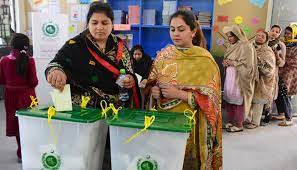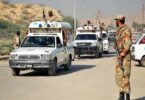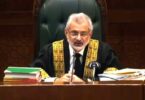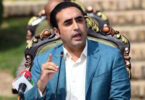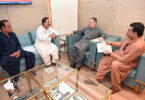F.P. Report
ISLAMABAD: Approximately 60 million voters went to the polls in Pakistan on Feb 8 to elect their representatives in 265 National Assembly and 590 provincial assembly constituencies in one of the country’s most competitive political contests, says Fafen.
The Free and Fair Election Network (Fafen) issued a report on Saturday, saying the elections followed two tumultuous years of political upheaval, discord and polarisation, which left behind a debris of constitutional confusions, judicial misadventures, communal stress, economic downturn and growing public distrust in electoral institutions – issues that must be taken up by the future government as its top priorities.
Fafen added that despite a spiral of allegations by multiple political parties about not getting a level playing field as well as a spike in militant violence in some parts of the country, none of the political parties backed out of the electoral race. All parties continued until the last minute their efforts to muster up public support, which augurs well for Pakistan’s struggling democracy. In addition, the pre-election perception of an unlevel playing field does not seem to have prevented the accusing political parties from gaining electoral ground.
Notwithstanding the general perception that pre-election media freedoms were constricted and sporadic incidences of restrictions on expression and speech, in fact Pakistani print, electronic and digital media continued to contribute tremendously to strengthening the political and electoral process.
The media kept voters informed through their undiluted reporting, which helped voters make informed choices. Independent civil society groups deserve praise in particular for focusing attention on rights and liberties during the election process, including infringements of the rights of citizens and political parties.
The report said unfazed by a spate of scathing criticism from some political parties, the Election Commission of Pakistan (ECP) must particularly be acknowledged for having organised the country’s largest electoral exercise – with the greatest number of candidates and highest number of voters – in a reasonably orderly manner.
More than 1.1 million election officials performed election duties in a highly challenging political environment. They ensured the integrity of voting and counting processes at the polling stations that largely remained free of controversy, notwithstanding sporadic complaints by political parties and candidates about not getting the election results forms to which they are legally entitled.
More than 0.7 million police and military officials stood guard across Pakistan and outside polling stations, ensuring peace and order on the election day against the backdrop of fears of militant and political violence. The report added that whatever the reasons and explanations, the ECP’s delay in the preparation and announcement of preliminary election results overshadowed an otherwise orderly election, raising questions about the credibility of the election outcome.
In addition, the caretaker government’s suspension of cellular and internet services on election day – regardless of the security reasons – undermined years of parliamentary efforts to reform the election results management process through amendments to the Elections Act, 2017, which were meant to maximise the integrity, efficiency and transparency of electoral outcomes. Fafen said the country had found a closure to a period of unsettling uncertainty that was not only exhausting for the people but also for the economy, with lingering inflation, unemployment and general disenchantment.
“Now it is the responsibility of political parties to bring to end their obstinate disengagement for a smooth transition of power in order to ensure the much-needed political stability in the country,” the report stressed. “Many of the concerns raised by the political parties and their candidates need to be addressed on legal merit by the ECP as promptly as possible, while residual matters can be addressed by the election tribunals that will be formed and start working in less than two months,” the report observed.

